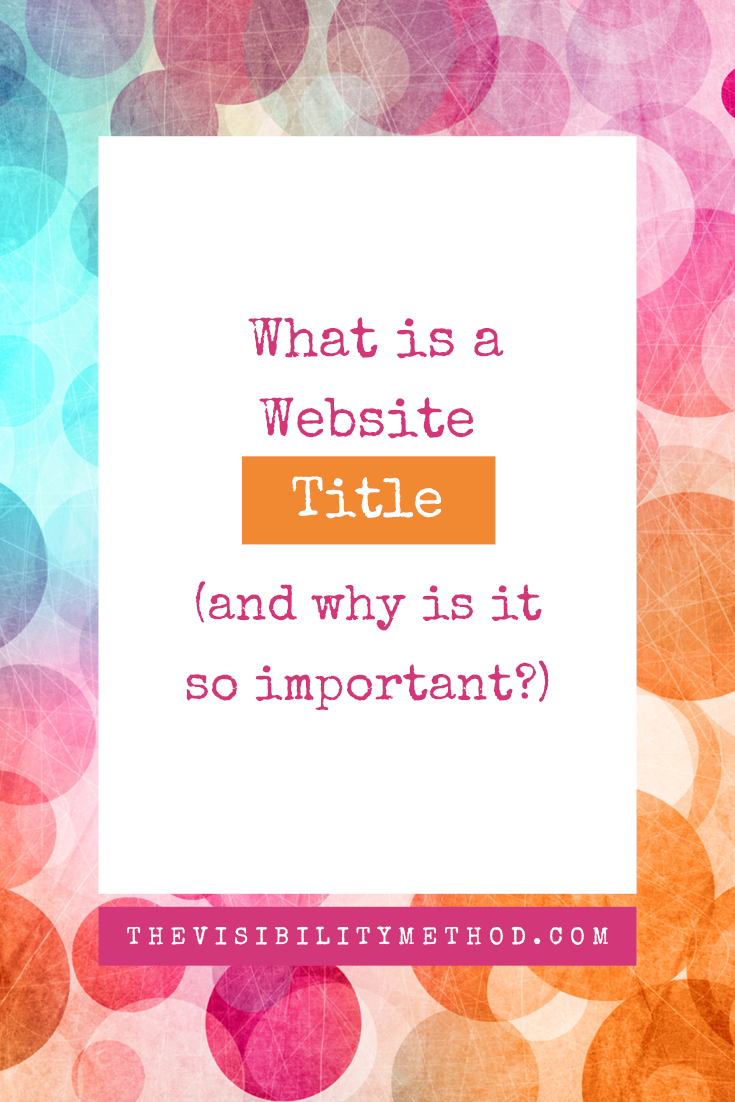Having a website for your business is always a smart move. But if your site isn’t optimized correctly, then it probably isn’t bringing in much traffic. Web optimization is essential to making sure your brand is visible on the internet, bringing in traffic, and increasing your revenue. With an optimized website, search engines will be able to read your pages, make sure your business gets in front of the right audience, and make it easier for customers to find the products they want. One of the most simple and impactful methods of optimizing your website lies in your website title.

This may seem obvious, but a website title, also known as a title tag, is exactly that — the title of a webpage that explains the content of the site.
Website titles are useful for both search engines and internet users. Search engines use website titles to determine how relevant a webpage is to a search query, and then include the site in relevant searches.
Internet users need website titles so they can decide if your site is relevant to their search/needs.
Another way the website title is useful for internet users is that it allows the user to easily navigate back to your site if they have multiple tabs open.
For example, let’s say someone is researching the best bath bombs for sensitive skin and they happen across your site that sells natural bath bombs. The user can keep your tab open for comparison, and easily navigate back to the correct tab because of the title of your page.
Website titles tell users what your business is about. It’s also one of the few factors you have control over when it comes to search engine ranking.
The title of your site is the first thing potential customers will see. So it plays a huge role in attracting the right audience!
Crafting the perfect website title doesn’t have to be hard! Just follow these tips and you’ll be well on your way to mastering title tags!
Here are a few of our favorite title tags that kill the website title game!
Also, Coschedule.com offers a free headline analyzer that is perfect for helping you come up with titles.
It’s a free tool that analyzes your title based on word balance, headline type, length, keywords, and sentiment. Click here to try it out!
Your page titles are used to help search engines find your page. So having an unnamed page is essentially the same as not having that page.
Google displays up to 50-60 characters, so make sure you’re utilizing that!
Even if your pages are similar, never use the same title for multiple pages. You want each title to accurately describe the content on each site, so having a unique title tag is essential. This also helps each web page rank in searches.
Keywords are awesome — in moderation.
Oversaturating your titles with keywords leads to a term called “keyword cannibalization.” This means:
Related: Buying Intent Keywords: What Are They and Why Do You Need Them?
And there you have a super simple way to improve your website’s SEO and search engine ranking!
Have any questions? Feel free to comment down below!
 Welcome! My name is Glenneth and I live in beautiful East Tennessee. I wear many hats: CEO of The Visibility Method, SEO & Google Ads Expert, content creator, and more. I love technology, social media, and weight lifting. My favorite place to hang out is the hammock in my backyard. My favorite colors are pink and orange. My favorite team is the Vols. And I LOVE to get email so please drop me a note and say hi!
Welcome! My name is Glenneth and I live in beautiful East Tennessee. I wear many hats: CEO of The Visibility Method, SEO & Google Ads Expert, content creator, and more. I love technology, social media, and weight lifting. My favorite place to hang out is the hammock in my backyard. My favorite colors are pink and orange. My favorite team is the Vols. And I LOVE to get email so please drop me a note and say hi!